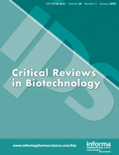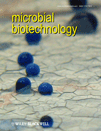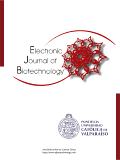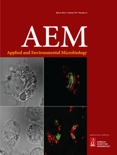
Microbial Cell Factories
Scope & Guideline
Advancing the Frontiers of Microbial Innovation
Introduction
Aims and Scopes
- Metabolic Engineering:
The journal extensively covers the metabolic engineering of various microorganisms, particularly bacteria and yeast, to optimize the production of desired metabolites, such as biofuels, amino acids, and bioplastics. - Synthetic Biology:
Research articles often delve into synthetic biology approaches, including the design and construction of novel biosynthetic pathways, gene editing techniques like CRISPR/Cas9, and the development of synthetic gene circuits. - Fermentation Technology:
Innovations in fermentation processes are a key focus, with studies on optimizing fermentation conditions, scaling up processes, and developing novel bioreactor designs to improve yield and efficiency. - Bioprocess Development:
The journal emphasizes the development of bioprocesses for industrial applications, including the use of bioreactors, optimization of growth media, and strategies for downstream processing. - Bioremediation and Environmental Biotechnology:
Research on the use of microbial systems for bioremediation and the conversion of waste materials into valuable products is frequently featured, highlighting the environmental applications of microbial technology.
Trending and Emerging
- Sustainable Biofuel Production:
There is a growing emphasis on developing sustainable biofuel production processes using engineered microorganisms, particularly focusing on lignocellulosic biomass and waste substrates. - CRISPR and Genome Editing Technologies:
The application of CRISPR and other genome editing technologies for precise modifications in microbial genomes is increasingly popular, enabling enhanced production capabilities and novel metabolic pathways. - Microbial Consortia and Co-culturing:
Research on the use of microbial consortia and co-culturing systems is trending, as these approaches can improve metabolic efficiencies and facilitate the production of complex compounds. - Bioprocess Automation and High-Throughput Screening:
The integration of automation and high-throughput screening techniques in bioprocess development is on the rise, enabling faster identification and optimization of microbial strains and production conditions. - Production of Value-Added Chemicals from Waste:
There is a significant trend towards utilizing waste materials for the production of value-added chemicals, reflecting a circular economy approach in biotechnology.
Declining or Waning
- Traditional Antibiotics Production:
There has been a noticeable decline in publications focused on the production of traditional antibiotics, as interest shifts towards novel antimicrobial agents and alternative therapeutic approaches. - Basic Microbial Physiology Studies:
Research that primarily investigates fundamental microbial physiology without a clear application towards biotechnological advancements has become less frequent, with a stronger emphasis on applied research. - Natural Product Discovery:
While still relevant, the exploration of natural product biosynthesis from microorganisms has seen a decrease in frequency, as the field moves towards engineered and synthetic pathways for production.
Similar Journals

APPLIED MICROBIOLOGY AND BIOTECHNOLOGY
Unleashing the potential of microbes for a sustainable future.Applied Microbiology and Biotechnology, an esteemed journal published by Springer, serves as a vital resource in the domains of microbiology and biotechnology. With an impressive impact factor reflecting its quality, the journal holds Q1 rankings in various categories including Applied Microbiology and Biotechnology, Biotechnology, and Medicine (Miscellaneous) as of 2023. Spanning the years from 1984 to 2024, it underscores its commitment to disseminating groundbreaking research that addresses pressing challenges in health, agriculture, and environmental sustainability. The journal is rigorously indexed and holds respectable positions in Scopus rankings, notably within the top 15% of Applied Microbiology and Biotechnology and the top 15% in Biochemistry, Genetics, and Molecular Biology. Although it is not Open Access, its comprehensive articles, reviews, and short communications are indispensable for researchers, professionals, and students eager to advance their understanding and application of microbial processes and biotechnological innovations in real-world contexts.

CRITICAL REVIEWS IN BIOTECHNOLOGY
Exploring Innovative Insights in Applied MicrobiologyCRITICAL REVIEWS IN BIOTECHNOLOGY, published by Taylor & Francis Ltd, stands as a leading journal in the field of biotechnology, consistently recognized for its rigorous peer-reviewed articles that impact the disciplines of Applied Microbiology, Biotechnology, and Medicine. With an impressive Q1 ranking in these categories and a significant influence reflected in its Scopus rankings—placing it within the top 5% of Applied Microbiology and the top 4% of Biotechnology journals—the journal serves as an essential resource for researchers, professionals, and students alike. Launched in 1983 and extending its coverage to encompass groundbreaking findings through 2024, it provides a rich forum for insightful reviews and innovative research that propel the field forward. Though not an Open Access journal, CRITICAL REVIEWS IN BIOTECHNOLOGY remains a vital point of reference for ongoing developments, critical analyses, and emerging trends, making it indispensable for those seeking to stay at the forefront of biotechnological advancements.

Microbial Biotechnology
Fostering collaboration in the realm of microbial sciences.Microbial Biotechnology, published by WILEY, stands at the forefront of innovation in the field of applied microbiology and biotechnology, showcasing cutting-edge research and advancements within both academic and industrial contexts. As an Open Access journal since 2012, it ensures that high-quality research is easily accessible to researchers, professionals, and students globally, promoting knowledge sharing and collaboration. With an impressive impact, the journal holds a Q1 ranking in its categories—Applied Microbiology and Biotechnology, Biochemistry, Bioengineering, and Biotechnology—demonstrating its significance in the scientific community. The journal currently boasts a strong Scopus ranking in several relevant disciplines, including a top 10% position in Applied Microbiology and Biotechnology, highlighting its critical role in disseminating influential findings. Designed to foster dialogue and advance technology within the microbial sciences, Microbial Biotechnology is an essential resource for anyone committed to leveraging microbial processes for sustainable and innovative solutions.

Biotechnology for Biofuels
Leading the charge in biofuel research and sustainability.Biotechnology for Biofuels, published by BMC in the United Kingdom, stands at the forefront of renewable energy research. As an open-access journal since 2008, it has become a critical platform for sharing innovative research and developments in the field of applied microbiology and biotechnology, particularly in the sustainable production of biofuels. With an impressive 2023 ranking of Q1 in multiple categories—including Applied Microbiology and Biotechnology, Biotechnology, and Management, Monitoring, Policy and Law—this journal offers unparalleled visibility and accessibility for your work. Its Scopus metrics underscore its influence, with rankings in the top 10% across several categories, emphasizing its integral role in advancing research on environmental sustainability and bioenergy solutions. Researchers, professionals, and students alike will find in this journal a rich resource for current studies, methodologies, and policies essential for navigating the complex landscape of biofuel technology.

BIOTECHNOLOGY LETTERS
Connecting Researchers to Shape the Future of BiotechnologyBIOTECHNOLOGY LETTERS is a prestigious peer-reviewed journal that has been at the forefront of biotechnology research since its inception in 1979. Published by Springer, this esteemed journal serves as a vital platform for disseminating cutting-edge research in the fields of applied microbiology, bioengineering, and biotechnology, with a focus on innovative methodologies and technologies. With an impact factor reflecting its critical contribution to the discipline, BIOTECHNOLOGY LETTERS resides in the Q2 and Q3 tiers of various scientific categories, placing it among the notable journals in the biotechnological landscape. Although it offers traditional access options and does not feature open access, the journal embraces a global readership, encouraging submissions from researchers, professionals, and students eager to explore the dynamic advancements in biotechnology. Situated in the Netherlands, it continues to shape the future of the field through relevant, impactful research that addresses contemporary challenges and opportunities in medicine and beyond.

ELECTRONIC JOURNAL OF BIOTECHNOLOGY
Unlocking Knowledge in Applied Microbiology and BiotechnologyThe Electronic Journal of Biotechnology is a premier Open Access journal published by Pontificia Universidad Catolica de Valparaiso, Chile, dedicated to advancing the fields of applied microbiology and biotechnology. With its inception in 1998 and an unwavering commitment to sharing knowledge, the journal has garnered a respectable ranking within the Q3 quartile for both its biotechnology and applied microbiology categories as of 2023, reflecting its significance in the academic community. Researchers and professionals will find its editorial rigor complemented by a robust platform for disseminating innovative findings, fostering collaboration, and driving forward biotechnology discussions. Given its inclusive approach, having transitioned to Open Access in 2014, the journal ensures that research is accessible to a global audience, making it a valuable resource for students, academics, and industry practitioners alike. Through the publication of original research, reviews, and critical insights, the Electronic Journal of Biotechnology aims to bridge the gap between scientific discovery and practical application, ultimately contributing to advancements in health, agriculture, and environmental sustainability.

APPLIED AND ENVIRONMENTAL MICROBIOLOGY
Pioneering Research for Environmental and Industrial SolutionsApplied and Environmental Microbiology, published by the American Society for Microbiology, stands as a leading journal in the fields of applied microbiology and environmental science since its inception in 1976. With a prestigious Q1 quartile ranking across multiple categories including Applied Microbiology and Biotechnology, Ecology, and Food Science, this journal consistently disseminates high-impact research that drives innovation and advances our understanding of microbial interactions within our ecosystems and industries. As ranked by Scopus, it exhibits prominent rankings in various related fields, underscoring its critical role in shaping contemporary microbiological research. Researchers, professionals, and students alike can stay abreast of groundbreaking studies while contributing to a vast body of knowledge that spans diverse aspects of microbiology, biotechnology, and ecology, ultimately contributing to sustainable practices. Join the community of dedicated scholars and explore vital research findings that impact both environmental health and technological advancement.

JOURNAL OF MICROBIOLOGY AND BIOTECHNOLOGY
Bridging Science and Application in MicrobiologyJOURNAL OF MICROBIOLOGY AND BIOTECHNOLOGY, published by the Korean Society for Microbiology and Biotechnology, is a premier academic journal based in South Korea that has been at the forefront of advancing knowledge in the fields of microbiology, biotechnology, and their applied sciences since its inception in 1991. This journal holds a commendable Q2 quartile ranking in key categories, including Applied Microbiology and Biotechnology, showcasing its significant impact within the academic community. With an emphasis on high-quality, peer-reviewed research, the journal aims to disseminate innovative findings that foster deeper understanding and advancements in microbial and biotechnological sciences. Researchers, professionals, and students utilize this journal to stay informed about contemporary developments and to inspire future investigations. Although it is not an open-access journal, its content is accessible through various academic libraries and databases, providing a vital resource for those engaged in cutting-edge research.

APPLIED BIOCHEMISTRY AND BIOTECHNOLOGY
Driving Discoveries in Applied Microbiology and BeyondApplied Biochemistry and Biotechnology is a leading journal published by Springer, dedicated to advancing research in the interdisciplinary fields of biochemistry, biotechnology, and applied microbiology. Established in 1981, this peer-reviewed journal covers a wide range of topics that encompass innovative techniques, methodologies, and applications of biochemistry and biotechnology in medicine, environmental engineering, and molecular biology. With a Q2 ranking in several categories and an increasing impact factor, the journal demonstrates significant influence and credibility within the scientific community. While traditionally subscription-based, the journal offers avenues for open access through selective agreements, making high-quality research accessible to a broader audience. Researchers, professionals, and students alike will find Applied Biochemistry and Biotechnology to be an invaluable resource for the latest developments and applications in biochemistry and its related fields, aiding in the quest for sustainable solutions and novel biotechnological advancements.

JOURNAL OF BASIC MICROBIOLOGY
Unveiling the Secrets of Microbial LifeJOURNAL OF BASIC MICROBIOLOGY is a premier publication in the field of microbiology, published by WILEY since 1985. With a significant presence in Germany, this journal encompasses a wide spectrum of research topics, focusing on applied microbiology and biotechnology as well as diverse areas within medicine. Holding a commendable Q2 ranking in both its categories for 2023, it plays a crucial role in disseminating innovative findings and methodologies to the community. Researchers will find it to be an essential platform for sharing high-quality work, where it currently stands at rank #47 in the applied microbiology and biotechnology category, representing the 63rd percentile among international journals. The JOURNAL OF BASIC MICROBIOLOGY caters to a growing audience of professionals and students, offering insights essential for advancement in microbiological research and its applications. While it does not currently offer an Open Access option, it remains an influential outlet for academic excellence, continuously contributing to the development of the field through its rigorous peer-reviewed articles.